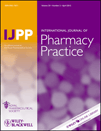How to engage experienced medicine users at the counter for a pharmacy-based asthma inhaler service
Abstract
Objectives Recent studies have identified recruitment of customers at the pharmacy counter as a limiter to successful provision of cognitive services in community pharmacies especially that of experienced customers with refill prescriptions. The aim of the paper is to gain insight into current problems of recruiting.
Methods A qualitative study was conducted based on semi-structured interviews with 12 participants in a project in 2010 aimed at optimising recruitment of experienced asthma patients for the Inhaler Technique Assessment Service in Denmark. An ad hoc analysis was applied in order to interpret pharmacy staff perceptions of experienced asthma patients in comparison with newly diagnosed patients and to categorise the types of developed recruitment strategies as to whether they reflected a technical or everyday-life perspective on medicine.
Key findings Effective recruitment processes were found to follow a generic pattern which consisted of a special type of opening question followed by providing a justification for the service. The participants perceived that the main difference between experienced and newly diagnosed patients was their degree of knowledge about their condition or correct inhaler technique. Most questions, and especially those related to reasons for motivating the customer to accept the service, were dominated by a professional technical understanding of medicine. In particular, follow-up justification based on a life-world perspective needs to be developed further. The identified type of communication might prevent some customers from accepting the service as they are not motivated by technical arguments but rather by how their daily symptoms can be relieved.
Conclusions Pharmacy staff should focus both on adequate opening questions as well follow-up justification when trying to recruit customers for cognitive services. The study might inform future studies on how to create new and more adequate strategies for recruitment of customers for relevant cognitive services in community pharmacies.




